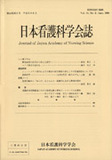Japanese
English
- 販売していません
- Abstract 文献概要
- 参考文献 Reference
要旨
介護者の疲労の実態とショートステイ利用による疲労の変化を知る目的で,静岡市内の特別養護老人ホームのショートステイを利用する介護者34人に対して,利用開始時と終了時の2回,蓄積的疲労徴候調査(CFSI)を実施し,以下の結果を得た.
1.ショートステイの利用前の介護者の疲労は身体的特性が高かった.また,疲労は介護者の自由時間に関連がみられた.
2.CFSIの結果,慢性疲労,一般的疲労感,不安感,抑うつ感(p<0.01),イライラの状態,気力の減退(p<0.05)の6特性が有意に減少した.
3.改善群は74.9%(27人),非改善群は20.6%(7人)であった.
4.社会的活動の改善に関連がみられた要因は,ショートステイの利用理由および利用日数であった.
以上からショートステイは介護者の生理的疲労・精神的疲労の改善および社会的活動の拡大に有効であることが示唆された.
Abstract
In order to understand the fatigue of in-home caregivers of the elderly and the remedical effects of temporary nursing home assistance (i. e., “respite care service”), pre- and post-service surveys were conducted on the Cumulative Fatigue Symptoms Index (CFSI) of 34 in-home caregivers who use the respite care service offered by a nursing home in Shizuoka, Japan.
The results of these two surveys are as follows:
1) The physical fatigue of caregivers before using the respite service is higher, and caregiver's free time is related to their feelings of fatigue.
2) According to CFSI figures, chronic fatigue, general fatigue, anxiety, depression (p<0.01), and irritability caused by excessive workload and reduced vitality (p<0.05) were significantly reduced by the services given.
3) Twenty-seven caregivers, or 79% of the sample, showed some improvement, while the remaining 7 caregivers (21%) showed none.
4) Factors which may have affected the degree of fatigue recovery were shown, including reasons and days for using the respite service.
Copyright © 1994, Japan Academy of Nursing Science. All rights reserved.


